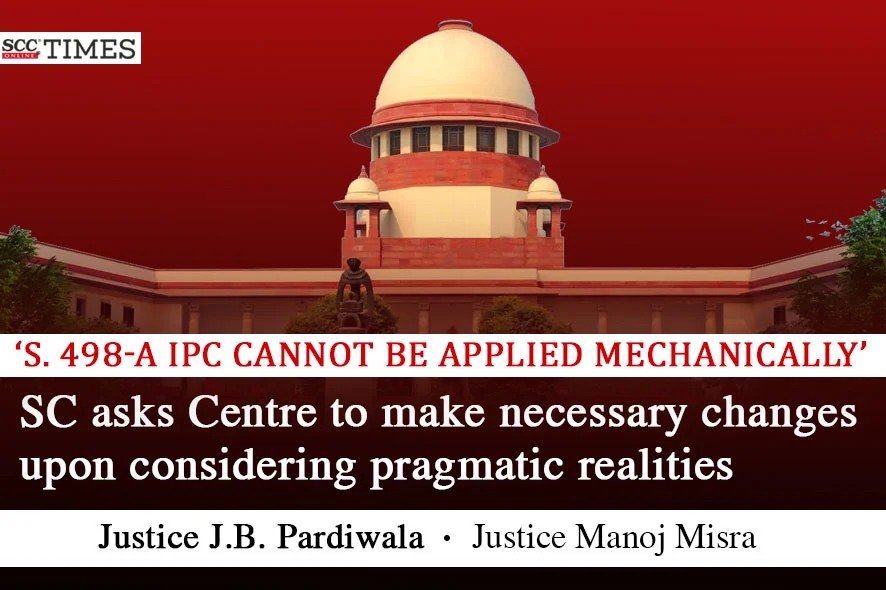Supreme Court: In a criminal appeal against Punjab and Haryana High Court’s decision, whereby the High Court refused to quash the chargesheet filed against the accused husband for offences under Section 323, 406, 498-A and 506 of the Penal Code, 1860 (‘IPC’), the Division Bench comprising of JB Pardiwala* and Manoj Misra, JJ. allowed the appeal and set aside the impugned decision. The Court also quashed the criminal proceedings against the accused husband.
The Court also noted that Section 85 and 86 of the Bharatiya Nyaya Sanhita, 2023 are a verbatim reproduction of the Section 498-A of the IPC, and they required necessary changes in the light of prevalent situation, that it is being misused widely.
Factual Matrix
The accused husband and wife got married in October 2008 and lived together for more than a decade and had a child. In the matter at hand, the wife, an Assistant Professor, registered a First Information Report against the accused husband alleging that the accused husband and his family demanded dowry and thereby caused mental and physical trauma. It was alleged that after marriage, the accused husband and his family started harassing the wife on the false pretext that she had failed to discharge her duties as a wife and daughter-in-law and also pressurised her for more dowry. The wife, also alleged that the accused-husband was an alcoholic and harassed her physically. It was also alleged against her sister-in-law that she demanded a diamond necklace and threatened her of drawing her out of the matrimonial home.
It was also stated the FIR that the accused husband and his wife kept all her salary and assaulted her whenever, she asked for money. Wife also alleged that the accused husband had an extra-marital affair. After investigation, the chargesheet was filed, which culminated into a criminal case before the Judicial Magistrate, First Class, Hisar. The High Court, in the impugned decision, declined to quash the criminal proceedings in exercise of its inherent powers under Section 482 of the Criminal Procedure Code, 1973 (‘CrPC’). Hence, the present appeal.
Analysis
The Court noted that the accused husband filed a divorce petition in July 2019 on the ground of cruelty, but it was withdrawn as he was finding it difficult to take care of his child, while travelling all the way to Hisar on the dates fixed by the Court. On perusal of the FIR, the Court stated that the chargesheet papers indicated that the allegations levelled by the wife, were quite vague, general and sweeping, specifying no instances of criminal conduct, and that no specific date or time of the alleged offences was disclosed. The Court also noted that the police had dropped the case against the other members of the accused husband’s family. The Court viewed that the FIR lodged by the wife was a counterblast to the divorce petition and the domestic violence case, registered by her mother-in-law against her.
Further, the Court noted that the FIR was filed 2 years after the filing of the divorce petition by the accused husband and 6 months after the filing of the domestic violence case by her mother-in-law and this delay in filing the FIR was unexplained, hence, the Court opined that the same was filed only to harass the accused husband and his family members.
Dealing with the question of quashing the FIR, the Court dealt with Section 482 of the CrPC at lengths and referred to R.P. Kapur v. State of Punjab, 1960 SCC OnLine SC 21 wherein, categories of cases where inherent power can, and should be exercised to quash the proceeding, were summarised. The Court said that if a person is made to face a criminal trial on some general and sweeping allegations without bringing on record any specific instances of criminal conduct, it is nothing but abuse of the process of the Court. The Court explained that the Court has a duty to thoroughly scrutinise the allegations to find out, prima facie, whether there is any grain of truth in the allegations or whether they are made only with the sole object of involving certain individuals in a criminal charge, more particularly when a prosecution arises from a matrimonial dispute.
The Court relied on Preeti Gupta v. State of Jharkhand, (2010) 7 SCC 667 wherein it was highlighted that most of these complaints under Section 498-A IPC are filed in the heat of the moment over trivial issues without proper deliberations and a large number of such complaints which are not even bona fide and are filed with oblique motive. At the same time, rapid increase in the number of genuine cases of dowry harassment are also a matter of serious concern.
The Court also relied on Arnesh Kumar v. State of Bihar1, wherein, anticipatory bail was sought for offences under Section 498-A of the IPC and Section 4 of the Dowry Prohibition Act, 1961 and the Court explained the consequences of arrest which can lead to humiliation, curtailing freedom and cast scars. Placing reliance on State of Haryana v. Bhajan Lal 1992 Supp (1) SCC 335, the Court said that category 7- where a criminal proceeding is manifestly attended with mala fide and/or where the proceeding is maliciously instituted with an ulterior motive for wreaking vengeance on the accused and with a view to spite him due to private and personal grudge, listed in Bhajan Lal (supra) is applicable to the case like the present matter, a bit liberally.
“If the Court is convinced by the fact that the involvement by the complainant of her husband and his close relatives is with an oblique motive then even if the FIR and the chargesheet disclose the commission of a cognizable offence the Court with a view to doing substantial justice should read in between the lines the oblique motive of the complainant and take a pragmatic view of the matter.”
The Court stated that,“many times, the parents including the close relatives of the wife make a mountain out of a mole. Instead of salvaging the situation and making all possible endeavours to save the marriage, their action either due to ignorance or on account of sheer hatred towards the husband and his family members, brings about complete destruction of marriage on trivial issues. The first thing that comes in the mind of the wife, her parents and her relatives is the Police, as if the Police is the panacea of all evil.”
The Court added that the Police machinery cannot be utilised for the purpose of holding the husband at ransom so that he could be squeezed by the wife at the instigation of her parents or relatives or friends and in all cases, where wife complains of harassment or ill-treatment, Section 498-A of the IPC cannot be applied mechanically. Thus, the Court opined that if the criminal proceedings are allowed to continue against the accused husband, it will be abuse of process of law and travesty of justice. The Court said that the High Court should have exercised its inherent power under Section 482 of the CrPC for the purpose of quashing the criminal proceedings, in the present matter.
Decision
The Court allowed the appeal, set aside the impugned decision and quashed the criminal proceedings.
Direction to the Legislature to consider necessary changes
The Court perused Sections 85 and 86 of the Bharatiya Nyaya Sanhita, 2023 (BNS), which is to come into force with effect from 01-07-2024, and analysed the same in light of Preeti Gupta (supra), wherein it was observed that “a serious relook of the entire provision (Section 498-A) is warranted by the legislation. It is also a matter of common knowledge that exaggerated versions of the incident are reflected in a large number of complaints. It is high time that the legislature must take into consideration the pragmatic realities and make suitable changes in the existing law. It is imperative for the legislature to take into consideration the informed public opinion and the pragmatic realities in consideration and make necessary changes in the relevant provisions of law.” The Court noted that both the provisions of the BNS are a verbatim reproduction of the Section 498-A of the IPC, hence, directed the Legislature to look into the issue, considering the pragmatic realities and consider making necessary changes in Sections 85 and 86 respectively of the BNS before they come into force. The Court directed the Registry to send one copy each of the judgment to the Union Law Secretary and Union Home Secretary, to the Government of India who may place it before the Minister for Law and Justice as well as the Minister for Home.
CASE DETAILS
|
Citation: Appellants : Respondents : |
Advocates who appeared in this case For the appellant: For Respondents: |
CORAM :
Buy Penal Code, 1860 HERE
Buy Code of Criminal Procedure, 1973 HERE
1. (Criminal Appeal No. 1277 of 2014, decided on 2-07-2014).











